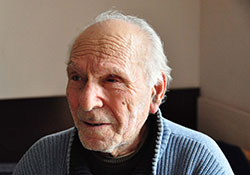Longevity in Tbilisi, Georgia

WHO/Malin Bring
Meet Nina Javakhishvili, a 97-year old who is still professionally active, and Giorgi Kistauri, a retired 93-year old who dedicates himself to his vineyard.
Her desk is covered with heaps of handwritten notes and scientific journals and, half hidden by a stack of papers, a small, red cell phone. No computer is in sight, however; 97-year-old Nina Javakhishvili, honorary director of the Scientific Research Institute of Morphology in Tbilisi, does all her writing by hand.
"My work has always been the main thing in my life, but of course my family means a lot, too," says the delicate, red-haired little woman, who, besides her position at the Institute also functions as editor-in-chief of a respected scientific magazine.
Advanced age is not unusual in Georgia. But a particular reverence and heightened attention seems to prevail around the slight figure at the Research Institute. Next to her writing desk, two portable electric radiators have been placed to keep her warm, and one of the staff members inquires if any of us visitors are infected by a cold. If so, we are requested to not sit too near the honorary director.
"We try to look after her a bit extra because of her age," he whispers to us. Nina Javakhisvili has lived through two world wars, one civil war and one revolution, and outlived most of her contemporaries. She has a large family, but no children of her own. Her husband, who was a surgeon, is deceased, and like most Georgians she lives in an extended family, together with her youngest niece. "We are three generations in the house. There would have been four of us, but one of the young girls moved out when she was due to have a baby," she says.
Old habits and new challenges
In another part of the Georgian capital, in a well-off residential area, the retired otolaryngologist Giorgi Kistauri sits himself down at a table in his son's spacious apartment.
"I come here to Tbilisi for a month in the winter, but most of the time I live alone on my farm, half an hour's ride from here," he tells us.
Georgi Kistauri is 93 years old and still works in his vineyard on most days. His wife passed away 12 years ago, and apart from his family in Tbilisi helping him to buy groceries and do laundry, he does all the work around the house and on the farm himself. "Manual work is the best physical exercise you can get. My biggest problem is walking the two-kilometer dirt road to the vineyard and back again. The walk tires me and sometimes I trip and fall, but I love the work, so what can I do?"
His vision is impaired nowadays, and Georgi Kistauri stopped driving a car when he turned 70. Beyond that his health is excellent, and he never catches a cold, he says. "Sometimes I have bad days of course, when I feel I have already seen everything worth seeing; but on the good days I'm happy to watch my children and grandchildren grow up. No, I really can't complain about my life. I always look forward to the next spring, you know."
Back at the Institute of Morphology, Nina Javakhishvili laughs a little when asked if she has any advice on how to have a long life. "Well, if you are a good person and avoid picking fights with people all the time, that will help you. And it's important not to worry too much."



